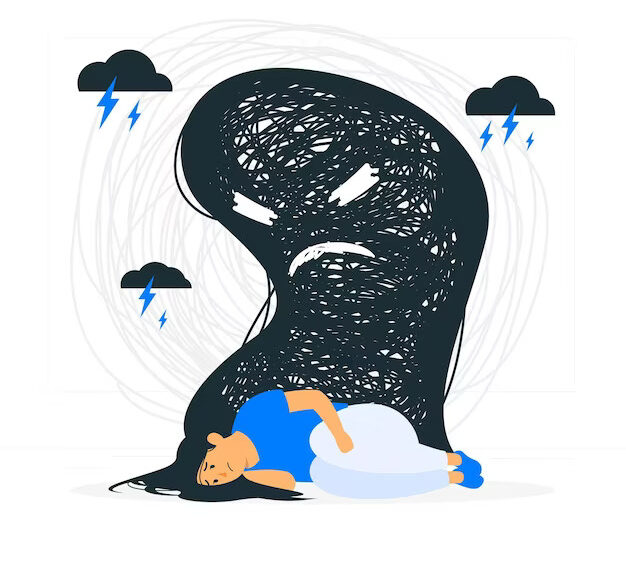Managing Nighttime Depression: Tips and Strategies

Nighttime depression, also referred to as nocturnal depression, is a specific form of depression where symptoms become more pronounced or predominantly occur during the nighttime hours. Individuals affected by nighttime depression often struggle with sleep-related problems such as difficulty falling asleep, staying asleep, or experiencing restful sleep. This type of depression can lead to frequent awakenings during the night and early morning disturbances. The disruption of sleep patterns tends to exacerbate feelings of sadness, despair, and anxiety, making it challenging to break free from the cycle of sleep disturbances and worsening depressive symptoms.
what is an example of Nighttime depression
Nighttime depression, also known as nocturnal depression, is when someone experiences heightened feelings of sadness, anxiety, or despair specifically during the evening or nighttime. For instance, a person with Nocturnal depression might find that as the day winds down and it’s time to sleep, their mood worsens, making it harder to relax and fall asleep. This can lead to tossing and turning in bed, waking up frequently during the night, or waking up very early in the morning feeling unrested. Nighttime depression can disrupt sleep patterns, leaving individuals feeling exhausted and irritable during the day.
What Causes Nighttime Depression?
If you’re experiencing nighttime depression, seeking help from professional therapists through “Online therapy” can aid in your recovery process.
- Circadian Rhythm Disruptions: Irregular sleep patterns or shift work can disturb the body’s natural sleep-wake cycle, contributing to Evening depression.
- Neurotransmitter Imbalance: Fluctuations in neurotransmitters like serotonin and dopamine during the night may lead to depressive symptoms.
- Stress and Anxiety: Quiet nighttime hours can exacerbate feelings of stress and anxiety, intensifying depression.
- Environmental Factors: Factors like noise, temperature, and lighting in the sleep environment can disrupt sleep and worsen depression.
- Social Isolation: Lack of social interaction during the night can increase feelings of loneliness and depression.
- Genetic Predisposition: Family history of mood disorders may increase susceptibility to nighttime depression.
- Trauma and Past Experiences: Unresolved trauma or emotional conflicts may resurface at night, impacting mood.
- Sleep Disorders: Conditions like insomnia or sleep apnea can co-occur with nighttime depression, exacerbating symptoms.
- Medications and Substance Use: Certain medications and substances can interfere with sleep quality and mood regulation.
- Hormonal Changes: Hormonal fluctuations, especially in women, can influence mood and sleep patterns.
- Chronic Health Conditions: Conditions like chronic pain or diabetes can affect sleep and contribute to depression.
- Seasonal Variation: Seasonal affective disorder (SAD) may worsen during the longer nights of winter.
- Poor Coping Mechanisms: Ineffective coping strategies can perpetuate nighttime depression.
- Lack of Physical Activity: Sedentary lifestyles can impact mood and sleep quality.
- Unhealthy Diet: Poor nutrition can affect neurotransmitter function and overall well-being.
- Lack of Sunlight Exposure: Reduced exposure to natural light during the day can disrupt circadian rhythms and mood regulation.
These factors interact in complex ways, contributing to the onset and exacerbation of nighttime depression. Understanding these underlying causes is essential for developing effective treatment strategies and promoting overall well-being.
Tips for Dealing with Nighttime Depression
Here are some tips for dealing with nighttime depression. “Sleep Counselling” can provide healing for you.
Set a regular sleep schedule: Go to bed and wake up the same time each day, even on weekends.
- Create a relaxing bedtime routine: Wind down with calming activities like reading, taking a warm bath, or light stretching.
- Optimize your sleep environment: Ensure your bedroom is dark, quiet, cool, and clutter-free.
- Manage stress throughout the day: Practice stress-relieving techniques like meditation or yoga.
- Limit caffeine and alcohol intake: Both can disrupt sleep quality.
- Avoid heavy meals before bed: opt for a light, healthy dinner instead.
- Get regular exercise: Aim for daily activity, but avoid strenuous workouts close to bedtime.
- Challenge negative thoughts: Use techniques like CBT to reframe negative thinking before sleep.
- Connect with others during the day: Combat loneliness through social interaction.
- Practice gratitude: Shift your focus to the positive by reflecting on things you’re grateful for.
- Seek professional help: Get personalized guidance and treatment from a therapist or counselor.
- Be patient and kind to yourself: Recovery takes time, celebrate small victories and seek support.
- Explore relaxation techniques: Find what works for you, such as meditation or deep breathing.
- Limit screen time before bed: Blue light from electronics can disrupt sleep.
- Consider light therapy (consult doctor): This may be beneficial for seasonal depression.
- Engage in activities you enjoy: Boost your mood with hobbies you find fun.
- Focus on what you can control: Remember, your thoughts, actions, and response to challenges are within your control.
In conclusion, nighttime depression is characterized by heightened feelings of sadness, anxiety, or despair specifically during the evening or nighttime hours. This can disrupt sleep patterns, leading to difficulty falling asleep, frequent waking during the night, or early morning awakening.


 English
English 
